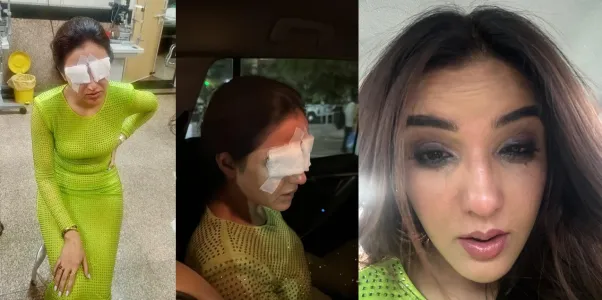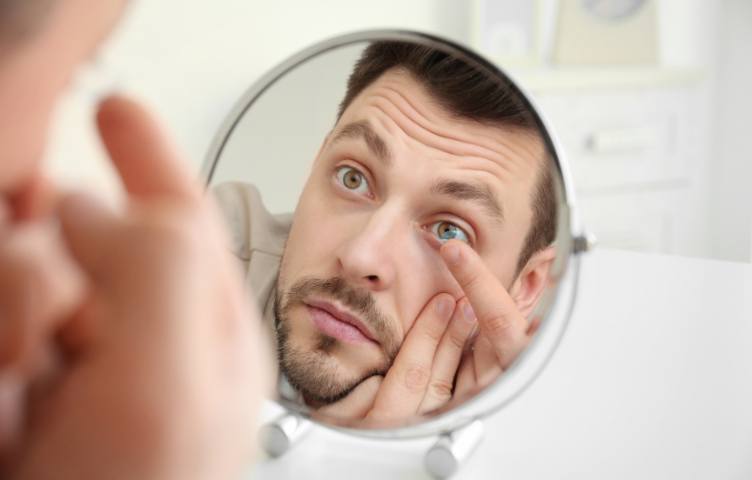Recently, popular actress Jasmine Bhasin made headlines after suffering severe corneal damage due to prolonged and improper use of contact lenses. This unfortunate incident has highlighted the importance of understanding the potential risks associated with contact lens use. Dr. Sonia Maheshwari Kothari, an esteemed eye specialist in Ghatkopar, Mumbai, at Clear Sight Eyecare & Laser Center, offers her expert advice on the matter.

Jasmine Bhasin said her corneas were damaged after she wore contact lenses for an event
In this blog, she discusses 10 risks of wearing contact lenses and provides guidance on how to make informed decisions about your eye health.
Contact lenses are a convenient alternative for those who wish to avoid spectacles or are not yet ready for surgical vision correction. They provide a full field of vision, move naturally with the eye, and reduce visual distortions significantly. Additionally, unlike glasses, contact lenses do not fog up or obstruct visibility in the rain, making them particularly practical for sports and outdoor activities. However, despite these advantages, contact lenses come with certain risks, which Dr. Sonia Maheshwari Kothari outlines below.
1. Limited Wearing Time
Contact lenses have a restricted wearing time, unlike glasses which can be worn throughout the day. Dr. Sonia Maheshwari Kothari advises her patients to wear contact lenses for a maximum of eight hours and strongly cautions against sleeping with them in the eyes. Extended wear lenses can be worn for longer durations, up to a week, but require regular monitoring to avoid complications such as infections.
2. Discomfort After Prolonged Use
It is common to experience initial discomfort when first using contact lenses, as the eyes gradually adapt. Dr. Maheshwari Kothari recommends starting with shorter wearing times and gradually increasing the duration. If discomfort persists, it may be necessary to consult her to assess whether the lens type is suitable or if a lens with higher oxygen permeability, such as silicone hydrogel lenses, might be more appropriate.
3. Dry Eye Syndrome
Dry eye is a common issue among contact lens users, even if symptoms are not immediately noticeable. Symptoms include dryness, a gritty sensation, redness, excessive tearing, and sensitivity to light. Dr. Maheshwari Kothari suggests using silicone hydrogel lenses, low water content lenses, or daily disposable lenses to minimize the risk of dry eye. For those experiencing discomfort, she may recommend preservative-free lubricating eye drops to enhance comfort.
4. Eye Allergies
Contact lenses can exacerbate eye allergies, particularly if not cleaned properly. Debris accumulation and dry eyes can lead to chronic irritation. Some individuals may also be allergic to contact lens cleaning solutions. Dr. Maheshwari Kothari advises regular cleaning of lenses and storage cases, and for those with persistent allergies, she may suggest switching to daily disposable lenses or changing the cleaning solution.
5. Challenges in Handling Lenses
Handling contact lenses can be challenging, especially for beginners or those with high eye power. Dr. Sonia Maheshwari Kothari emphasizes the importance of meticulous hand hygiene, proper nail care, and ensuring that patients are confident in handling their lenses before leaving her clinic. She also provides guidance on identifying whether a lens is inside out and advises on the correct steps.
6. Risk of Infections
One of the most significant concerns with contact lenses is the increased risk of eye infections, ranging from minor irritations to severe, vision-threatening conditions like corneal ulcers. Dr. Maheshwari Kothari stresses the importance of hygiene, including proper handwashing, regular disinfection of lenses and storage cases, and adhering to the prescribed wearing schedule. Patients should never use tap water or saliva to clean or store lenses.
7. Eye Makeup Considerations
For those who wear eye makeup, the risk of irritation or injury is higher with contact lenses. Dr. Sonia Maheshwari Kothari recommends applying contact lenses before makeup and choosing hypoallergenic products. She advises against applying eyeliner or kajal on the waterline, as makeup particles can stick to the lenses and cause discomfort.
8. Cleaning and Maintenance
Proper cleaning and maintenance of contact lenses are crucial to avoid infections and other complications. Dr. Maheshwari Kothari advises her patients to use sterile contact lens solutions, regularly clean the lens case, and avoid using tap water or saliva for cleaning. For those seeking a hassle-free option, she suggests considering daily disposable lenses, which offer greater convenience and comfort.
9. Protection from UV Radiation
While some contact lenses offer UV protection, they do not cover the entire eye or surrounding skin, leaving these areas vulnerable to UV damage. Dr. Sonia Maheshwari Kothari recommends wearing sunglasses in addition to UV-blocking contact lenses to ensure comprehensive protection against harmful rays.
10. Risk of Serious Eye Disorders
While most contact lens-related issues are minor, there is a risk of more severe eye disorders such as, conjunctivitis, corneal ulcers, and keratitis. Symptoms like pain, blurred vision, increased light sensitivity, and excessive tearing should prompt immediate consultation with an eye specialist. Dr. Maheshwari Kothari emphasizes the importance of discontinuing lens use and seeking prompt medical attention if these symptoms occur.
Contact lenses can significantly enhance your quality of life by reducing dependence on spectacles. However, they require diligent care and attention to hygiene to prevent complications. In Mumbai, where the incidence of myopia is on the rise, more people are turning to contact lenses for vision correction. Dr Sonia Maheshwari Kothari, who practices at Clear Sight Eyecare and Laser Centre in Ghatkopar, advises caution and proper care to ensure eye health.
For those considering a more permanent solution, Dr. Maheshwari Kothari offers LASIK surgery using the latest techniques, including Contoura Vision correction. LASIK has become much safer and more effective over the years, and Dr. Maheshwari Kothari has achieved a 100% success rate in her procedures. Her clinic in Ghatkopar provides this advanced surgery at a reasonable cost, helping countless patients achieve clear vision without the need for glasses or contact lenses.
If you’re considering vision correction, Clear Sight Eyecare and Laser Centre is your trusted destination for safe and successful LASIK surgery.

SEE WITHOUT GLASSES
Lasik
Connect, with Dr Sonia Maheshwari Kothari
☎️ 𝐂𝐚𝐥𝐥: 𝟖𝟎𝟗𝟕𝟖𝟎𝟗𝟕𝟖𝟖
📍 𝐀𝐝𝐝𝐫𝐞𝐬𝐬: 405, 4th, Monterossa, 90 Feet Rd, opp. Ganpati Mandir, Railway Police Colony, Ghatkopar East, Mumbai, Maharashtra 400077
🗺️ 𝐕𝐢𝐬𝐢𝐭: Best Eye Specialist in Ghatkopar, Mumbai | Cataract | LASIK | Squint- Dr Sonia Maheshwari Kothari

